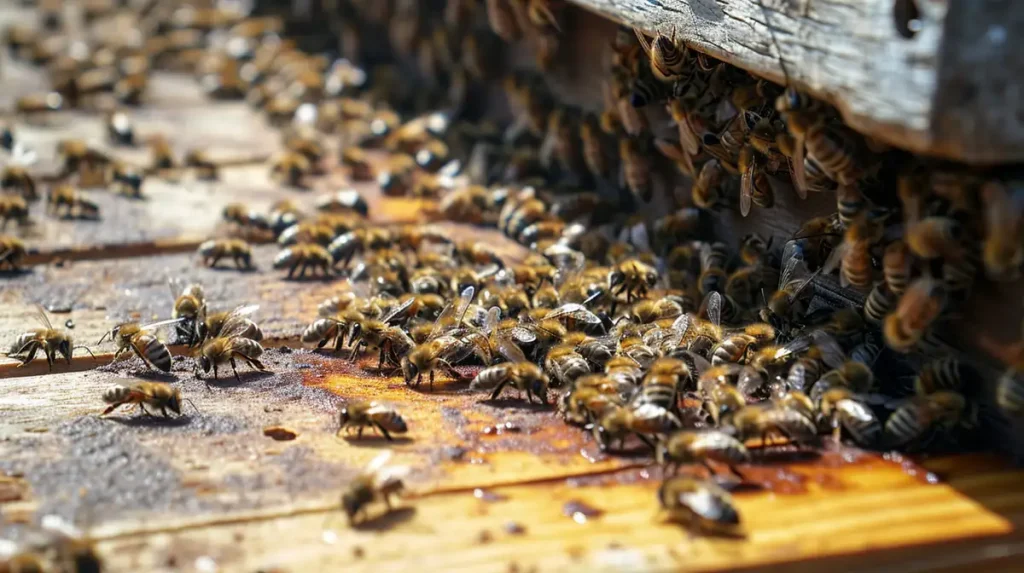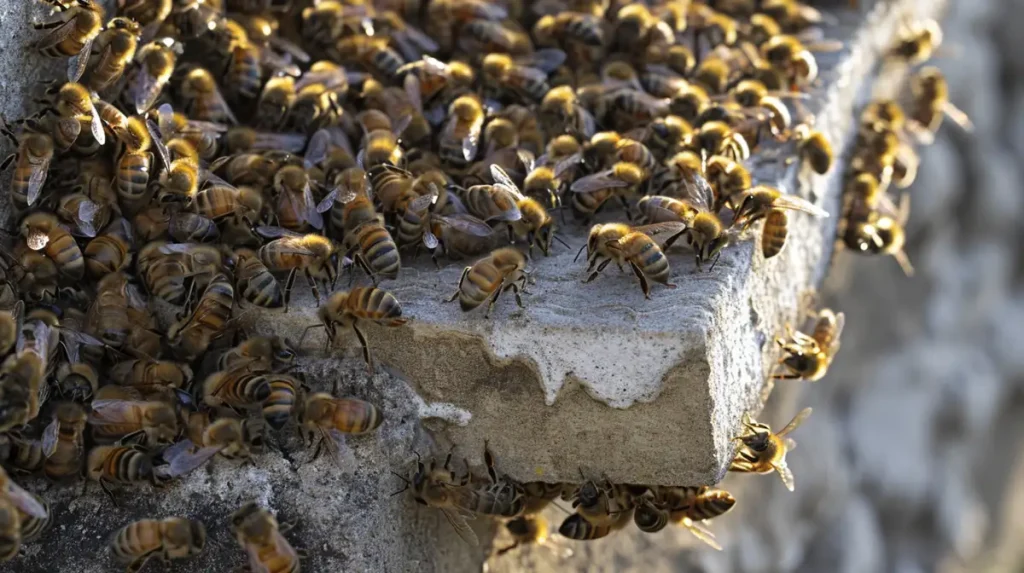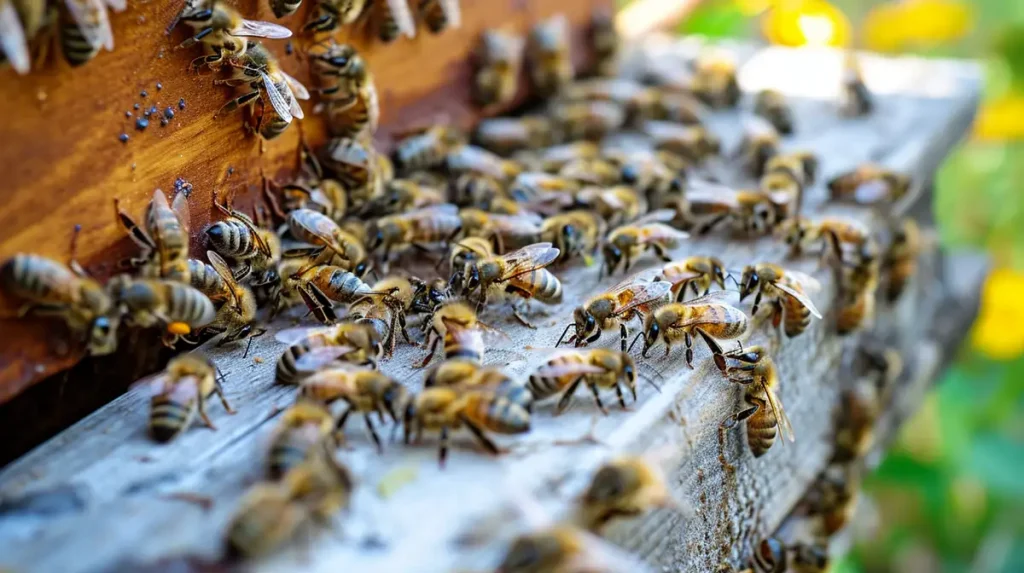Table of Contents
Yes, bees can engage in fights with each other, primarily when defending their hive against intruders, including bees from other colonies. Such conflicts are a part of their natural behavior to protect their resources and queen. For instance, guard bees at the hive entrance are known to challenge and fight off bees from other hives that attempt to steal honey or infiltrate the colony. These skirmishes involve physical grappling and may even lead to the death of the intruding bee.
In the below paragraphs, we will take a more detailed look at this topic.
A question many new and inexperienced beekeepers have is: “do bees kill each other”? The issue can occur when you have more than one hive and find that bees from one hive are killing those from another while trying to steal their honey stores.
The same thing can happen when bees from hives in the local area also attempt to steal honey from your hive, which could again result in the death of a number of your bees.
Why Would a Bee Kill Another Bee?
While bees are not inherently aggressive towards one another they will defend their colony with all their might. When a bee perceives a threat to the hive, it will release a pheromone that alerts other bees to the presence of danger. This pheromone triggers a response known as “alarm pheromone,” which signals to other bees to prepare for an attack.
In response, worker bees will swarm the perceived threat and attempt to sting it to death. These bees are willing to sacrifice their own lives to protect the hive and their queen.
In rare cases, a bee may also attack and kill another bee within the colony. This is typically the result of a dispute over resources such as food or a suitable spot to lay eggs. Queen bees, for example, may kill rival queens to ensure that they are the sole reproductive member of the colony.
It’s also possible for bees to accidentally kill one another during routine hive maintenance tasks. For example, when bees are removing dead or dying members of the colony they may inadvertently injure or kill a healthy bee.
Despite these instances of aggression, it’s important to remember that bees are highly social creatures that rely on cooperation and communication within the colony. The vast majority of bees will work together harmoniously to ensure the success of the hive.
It’s important to monitor the behavior of your bees and take steps to prevent aggression within the colony. This may involve ensuring that the hive has sufficient resources, such as food and space, and avoiding disruptive actions that could trigger a defensive response from the bees. By providing a safe and healthy environment for your bees, you can help to ensure their success and productivity.
Why Do Bees Rob Honey?
You might be wondering why bees would rob honey from another hive – after all, surely these bees are making their own?
The reality is that although bees are capable of making their own honey, at certain times of the year when there is a shortage of nectar (such as late summer and early fall), bees might start to “panic” that they do not have enough stores to last the hive over the winter. They will then head out to nearby hives to try to steal the honey to take it back to their own hive.
- Carter, Anthony (Author)
- English (Publication Language)
- 194 Pages - 02/28/2024 (Publication Date) - Independently published (Publisher)
Robbing is actually quite common during a nectar shortage, which can also occur outside of late summer and early fall. During extremely hot summers, when there is little-to-no rain, there can be a delay in the bloom of summer and fall flowers. This would mean bees are unable to collect nectar, which consequently causes them to turn to robbing behavior.

How Do You Keep Bees from Fighting?
Protecting your hive from robbing bees is the best way to stop them fighting with each other. During a nectar shortage, it is important to take steps to prevent your hive from being robbed. The best way to do this is to reduce the size and number of entrances to your hive. If there is just one entrance with a smaller opening, your own bees will find it much easier to defend the hive and will hopefully be able to prevent it from being robbed.
Also be careful not to leave honey in the open near to your hives because doing so could attract bees from the surrounding area. It is therefore best to extract honey inside during harvest.
During a shortage of nectar, you are probably going to need to feed your bees. If so, be sure to feed at dusk and take great care not to spill any syrup. Also check that your feeders are not leaking. Do this by putting water in them before the syrup; if there are no leaks, it is safe to add the syrup (after emptying the water, of course).
How to Tell if Robbing Bees are Near Your Hive
As you have ascertained from the paragraphs above, when nectar flow is reduced the risk of robbing bees is much higher than normal, which means you need to be on the lookout. It is easy to tell the difference between foraging and robbing bees. When bees are foraging, they will head straight from the hive to the nearest supply of nectar. On their return, they will be weighed down with pollen and nectar and will land heavily on the bottom board.
You might also notice young worker bees getting ready for their first flight. Before they head out, they will need to familiarize themselves with the hive’s location. They will do this by facing the hive and hovering around. You will see them darting up and down as well as back and forth.
Robbing bees look different and may appear quite aggressive as they hunt for honey. Instead of flying directly into the hive, they will fly from one side to another in the hopes of scooting past the bees guarding the entrance. You will also notice that they do not have any nectar or pollen.
When bees are attempting to rob a hive, the guard bees will defend; if you look very closely, you might notice bees fighting in front of the entrance or on the ground below.
Once invading bees have managed to get inside the hive to rob, they will need to climb out before flying away because they will be laden down with honey. When they do fly away, they will likely be flying lower due to the weight of the honey.

Why Have My Bees Become Aggressive?
Sometimes it is not other bees that you have to worry about, but your own. It might be that you have more than one hive and one is robbing from the other, or you may find that your bees seem to have become aggressive towards you. Either way, it is often a shortage of nectar that is causing this behavior.
Even if your bees were previously docile, you might find that they become aggressive as you approach the hive at certain times of the year. As mentioned, this often happens when the nectar supply has lessened, and the bees are aggressively trying to protect their stores of honey.
It can also occur for other reasons, such as a missing queen or uncomfortable weather conditions. If the queen has died or absconded, the bees will be anxiously trying to replace her. They will not have the benefit of the queen’s calming pheromone, which can disrupt the atmosphere within the hive. Furthermore, when the temperatures are extremely hot or when it is particularly wet, bees can become angry.
However, by far the most common reason for aggression in bees is a nectar dearth, which inevitably results in robbing. If your own bees do not have enough honey, they may begin aggressively searching for honey and start robbing other hives. Similarly, if their own hive is being attacked by robbing bees from another hive, they will become aggressive defenders of their home.
How Do You Calm an Aggressive Bee?
It may not be possible to calm an aggressive bee; how long they stay this way, usually depends on what caused the aggression in the first place. Of course, if weather is the cause of the behavior, you can expect your bees to calm down once their environment becomes more comfortable again.
I have already discussed steps you can take to prevent robbing. If you notice that bees are fighting outside the hive, try to reduce the entrance size of the hive to give your bees less of an area to guard.
If you are worried that your bees might be robbing another hive, feed them with supplementary sugar syrup.
Another thing to consider with aggressive bees is whether your queen has mated with an Africanized bee. Africanized bees are much more aggressive than European honeybees and this trait could be passing down the line. If you live in an area where there is a higher risk of Africanization, you might need to requeen your hive. When doing this, buy from a breeder with a good reputation and make sure you buy a mated queen.
Why Do Bees Fight Each Other – Conclusion
Bees often rob from other hives when their own honey stores are low. When robbing another hive, bees will fight with each other to the death to get what they want; the robbing bees will aggressively try to get the honey they desire while the defending bees will become aggressive when trying to protect their home and the bees within.
If your bees have become aggressive and are fighting, try to establish the cause and take immediate steps to rectify the problem.
Looking to up your beekeeping game? Check out our latest product recommendations so you can take things to the next level!
Introducing The Top 12 Best Beekeeping Veils For 2024
Introducing The Top 20 Best Beekeeping Gloves For 2024
Introducing The Absolute Best Beekeeping Suits For 2024
The 15 Top Beekeeping Books for 2024
The Top 11 Honey Extractors for 2024
The Top 12 Mason Bee Houses for 2024
Beekeeping Disclaimer:
Beekeeping, like any agricultural activity, involves inherent risks. It is important to understand these risks and take appropriate measures to mitigate them.
Potential risks associated with beekeeping include:
- Bee stings: Honey bees are generally not aggressive but can become defensive if they feel threatened or their hive is disturbed. Bee stings can cause allergic reactions or even anaphylaxis in some individuals, which can be life-threatening. It is important to wear protective clothing and follow best practices when handling bees to minimize the risk of stings.
- Diseases and pests: Bees can be vulnerable to various diseases and pests, including mites, viruses, and bacterial infections. These can have significant impacts on bee colonies, leading to reduced honey production or even colony collapse. It is important to monitor hives regularly and take appropriate measures to prevent and treat diseases and pests.
- Weather conditions: Extreme weather conditions, such as drought or cold temperatures, can affect the health and productivity of bee colonies. It is important to ensure that hives are appropriately sheltered and provided with adequate food and water.
- Environmental hazards: Bees can be affected by environmental hazards such as pesticide exposure, pollution, and habitat loss. It is important to be aware of these hazards and take appropriate measures to protect bee colonies and promote healthy environments for bees.
- Legal requirements: Beekeeping may be subject to local, state, or national regulations, such as registration or inspection requirements. It is important to be aware of these requirements and comply with them.
While beekeeping can be a rewarding and enjoyable activity, it is important to be aware of the potential risks and take appropriate measures to mitigate them. By following best practices and staying informed about the latest developments in beekeeping, beekeepers can help ensure the health and productivity of their hives and contribute to the well-being of bee populations worldwide.
Last update on 2024-04-25 / Affiliate links / Images from Amazon Product Advertising API


